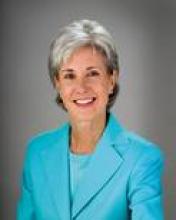The federal government recovered $2.5 billion in fraudulent Medicare payments in 2009, government officials said at a briefing May 13.
The Affordable Care Act – one of the health reform laws – gives government agencies new enforcement powers and new funding to go after fraud and abuse and physicians may find themselves under increased scrutiny as a result.
Daniel Levinson, the Health and Human Services Department Inspector General, said that the Affordable Care Act will require providers and suppliers to adopt compliance programs that meet core criteria. He added that his office will provide training to health care providers once those criteria are issued.
According to HHS Secretary Kathleen Sebelius, the Affordable Care Act provides $600 million over the next 10 years to combat fraud and abuse.
The law will make it more difficult to become enrolled as a Medicare or Medicaid provider as potential providers will be categorized as high, medium, or low risk of fraud at the time of enrollment. More face-to-face checks will be used to verify a provider’s legitimacy, she said, adding that the law increases penalties for fraud, and put more emphasis on real-time detection of fraud and abuse as opposed to the “pay and chase” model used now.
HHS and the Department of Justice also will look closely at adopting strategies used by credit card companies to immediately flag aberrant charges to stop fraud in its tracks, said Ms. Sebelius. Preventing waste, fraud, and abuse is especially important as the cost of health care continues to rise, Ms. Sebelius said.
“For years, we’ve tolerated health care fraud,” she said. “We’ve accepted that with any big enterprise there was going to be some waste and abuse, but those days are coming to an end. As we try to bring down skyrocketing costs across our health care system we can’t afford to ignore the billions of dollars we lose to fraud and theft.”
In 2009, the federal government received about $1.6 billion in settlements and judgments from hospitals, physicians and other health care providers, drug and device makers, and non-health providers that were found to have illegally billed federal health care programs. With penalties and settlements, $2.5 billion was returned to the Medicare Trust Fund and $441 million to Medicaid, according to the Health Care Fraud and Abuse Control Program Report.
A total of 583 individuals were convicted of health care fraud in 2009, by U.S. Attorneys’ Offices and federal prosecutors. On the civil side, the Department of Justice opened 886 new investigations and had 1,155 civil fraud matters pending.
Physicians were among those convicted or fined for fraud and abuse schemes, including a California physician who paid $2.2 million to settle allegations that between 2002 and 2006, he allowed his universal provider identification number to be used to bill Medicare for respiratory therapy. A Kansas cardiologist paid $1.3 million to settle allegations that his group submitted claims for services not provided.
Ms. Sebelius and Attorney General Eric Holder highlighted efforts by the Health Care Fraud Prevention and Enforcement Action Team (HEAT) Medicare Fraud Strike Force, which was begun in 2007 to address durable medical equipment fraud and abuse in south Florida.
The strike force has since been expanded to focus on potential hot spots of potential fraud, identified by claims patterns. In 2009, Los Angeles, Detroit, and Houston, were added; now the strike force also operates in Brooklyn, N.Y., Baton Rouge, La., and Tampa, Fla.
Ms. Sebelius said that new types of scams are emerging, as criminals attempt to take advantage of seniors who may not understand the health reform laws. Scam artists have gone door-to-door in some states selling bogus “ObamaCare” policies, or asking Medicare beneficiaries for identifying information to issue “new Medicare cards,” she said.
Other scams are tied to the issuance of rebate checks to Medicare beneficiaries whose Medicare Part D drug expenditures push them into the doughnut hole, Ms. Sebelius said.
The HHS is working with advocacy organizations to educate laypersons who can train their peers how to recognize illegal and inappropriate come-ons, she added.


